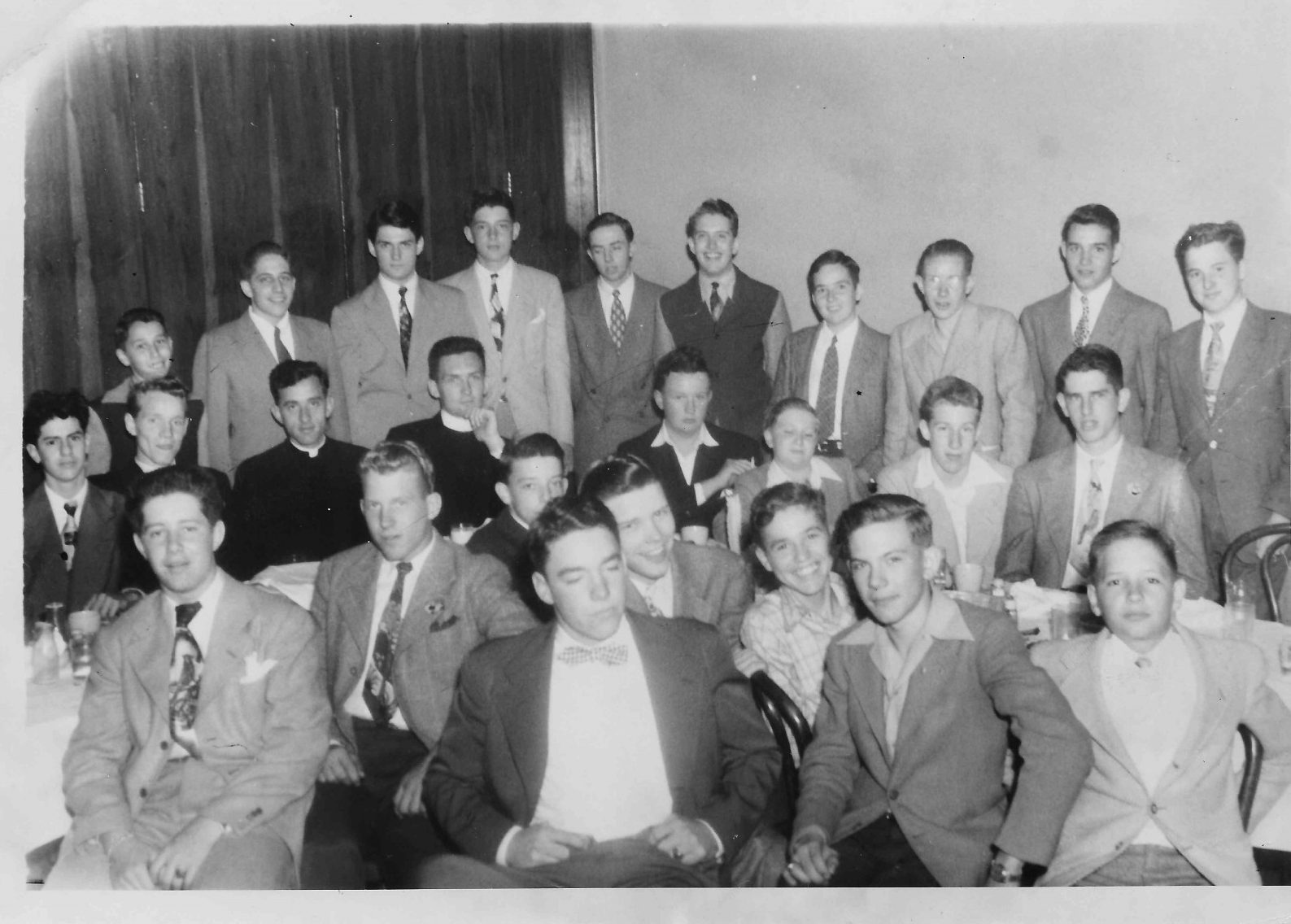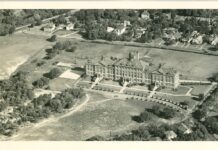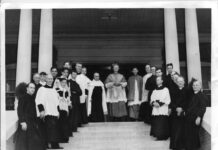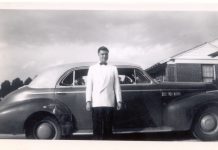Jesuit High – The early years
In August 1942 Dad took me to Jesuit to sign in. The 1st thing he said when we got out was, this was where he was to go to college at Dallas Univ. He received a football scholarship to attend but broke a leg that summer and lost out. He wanted me to do real good at Jesuit, and be the first in his family to finish college. This was news to me, since he wasn’t a Catholic then, just my Irish mother and 6 kids.
From my freshman year I recall some bullying, of a different kind right away. I had run into bullies when I was 10 years old, and learned from Dad that all bullies are cowards, and the last thing they want is to get in to a fight where they might get hurt. At Jesuit bullying was a group thing which surprised me.
That 1st year, with four new grades starting at one time Jesuit was very strict on student behavior. A boy I knew vaguely from church, Robert Klein, was at Jesuit that first year, and we later became good friends, but not through Jesuit, as he didn’t get to finish that year. In class one day the teacher left the room and a student behind Bob, by the side door, threw an eraser and hit him. He picked it up and fired it back. But at that moment Fr. Mulhern, the President, opened the door and the eraser hit him. No excuses allowed, or apologies accepted, Bob was expelled. It was part of the discipline expected, and rigidly enforced, especially in those years.
With this in mind, I was surprised one morning when Donald Schmidt ’44, came into the room of freshman class 1C to tell us that class 1A, mostly non-athletic, book worm types, had established a lunchtime meeting place, a copse of trees by the fence just above the lower field. Class 1B for some reason had decided they would take over this site and started getting there first and kicked 1A out. Don had come to class 1C, since he knew some of us, from the Sacred Heart Grade School–Joe Collins, Charlie Flores, Frank Patterson, John Wall and myself. He stated that the Jesuit teacher, at the front of the room, would let us out a little early, and we were to eat quickly and go to this location and keep class 1B from getting in.
This was done and class 1B got there and were a little surprised. Don was there and asked Charlie and me, unknowingly being right in front of most of class 1B, why we were there, and we told him that it was class 1A’s place and 1B was not allowed. He then told the closest guys in 1B, if they thought they could do anything about it they better get started. Which they did, and we had a good, mostly wrestling match, melee started. It didn’t last long before class 1B left, and while it was going on I glanced up toward school and there was a lone black robe watching everything that went on.
Why the latitude here? First, bullying is a different matter, and best solved by other responsible students. We never heard the phrase “men for others” in those early years, but this is where it should begin, in school. Preferably by classmates, but at least by upper classmen. And remember, anyone past their freshman year is an upperclassman.
In the spring of 1944, Donald Schmidt came up to me and asked if I could use his baseball shoes, which were my size, as he had to leave before graduation to go into the army. I was proud to wear them for many years, and donated them to Jesuit, under his name, when they asked for old sports gear some years ago.
In my senior year, I witnessed my first bad case of bullying. It was raining, a steady drizzle to keep everyone inside at lunchtime. I happened to walk by the big south door and saw a bunch of younger students watching a big sophomore, pushing younger freshmen out into the rain and not letting them back in. I walked up behind him and took him by the shirt collar, and the seat of his pants and put him out in the drizzle, and said, “Let’s see how you like it fellow.” He turned around ready to fight and then saw who it was. A head shorter, but a senior and a football player. With only about 45 seniors then, all the other students knew us by sight. He did threaten to have his big brother come down and beat me up, and I asked him to do that, as I felt sure he would like to hear what his little brother was doing.
During my senior year I heard of students being teased. Not as bad as bullying but something that should be done away with. In the summer of 1945, Jack Kocks, finishing his sophomore year and I my junior year, were both 15 and able to get a job selling ladies shoes at Burt’s on Elm St. There we met a fellow from Forest High in my grade, John Ralston. John was half Cherokee, raised in Dunne’s Orphan Home in Oak Cliff. An Aunt raised his younger sister, and he was now staying with her also. Since they were Catholic he got interested in Jesuit and enrolled for his senior year. John and I became good friends, and I served as his best man at his wedding with Edith Kallus.
Jack and I were the only ones John knew, and although I don’t think anyone would have tried to bully John, I found out one day at lunch that they were teasing him about him thick glasses. He was sitting with me at lunch, nervous and not eating. When asked, he told me he had got into trouble for people calling him “four eyes” due to his thick glasses. He tired of it and got crosswise with who but Doug Deffarari and was going to have to put on the gloves with him at lunchtime. Doug was not a bully, and probably not the first to call John “four eyes.” He was shorter than I at 5’9”, stout but not near as tough or mean as most people thought he was. He probably was regretting the boxing also.
In any event I told John not to worry. “You’re a lot taller, with thick gloves, so you couldn’t really be hurt, and your arms are a lot longer, so just keep jabbing at him,” and I thought he would be OK. So the fight got started with a large crowd urging Doug on, and Jack and I and a few others just watching. It had hardly started when John, somehow or other, hit Doug in the stomach, and Doug’s lunch was all over the gym floor. No one ever called John “four eyes” after that. If Doug couldn’t handle him, they wouldn’t try.
To wind this up, however, I would like to warn everyone, not to be too zealous about making judgements on something, as I was during my junior year. For lunch, seniors got out first, then juniors, etc. One day in line Bill Triece, a senior who I considered a good friend, (we both played football and were in the Philothespic together) came in and joined some friends at the front of the line. Some of the sophs or freshmen immediately started yelling, “Go to the end of the line!” Hearing them I told Bill he really should go to the end of the line, and when he didn’t reply I went forward to speak to him. I don’t recall what was said by him or me, but with his temper and my Irish “likewise,” there was a brief scuffle
which our friends there quickly ended. I had at least tried and the lower grades were satisfied. I also later realized that Bill might have been asked to do something by a teacher that may have delayed him.
Bill and I went on just fine. I saw him sometimes at Spring Hill in my freshman year there. Years later at the new school, Bill and I were together at a reunion and he asked, “Do you recall that incident we had in the lunch line? That really had you upset didn’t it?” I replied I had forgotten it the same day. He said, “Forget heck. I went with a friend to the bus stop at Fitzhugh and Buena Vista where you lived and saw you coming towards me swinging a length of chain.” I almost convulsed with laughter, and replied, “Bill, as soon as I got home Mom reminded me, ‘Joe, you told your Dad you would take his broken chain to Knox St. Hardware store to get it fixed’ and that was where I was going. We both laughed after that.
Bill may have spread the word though, which would explain why seniors were nicer to me that year.





